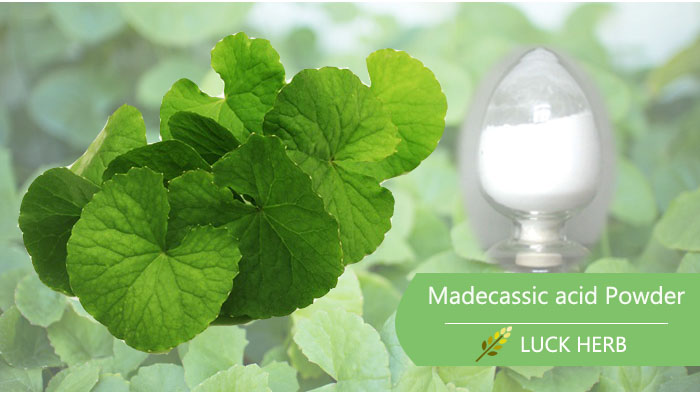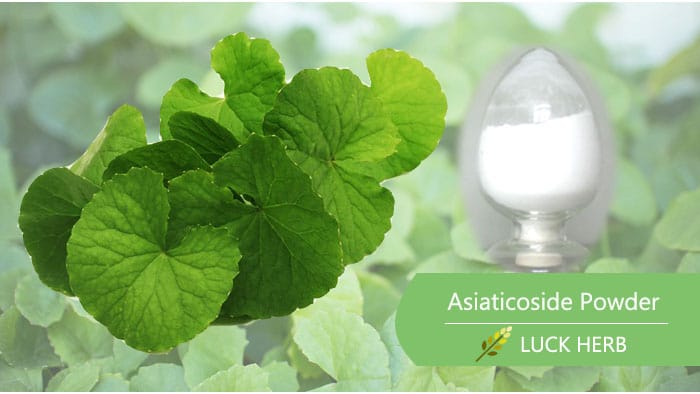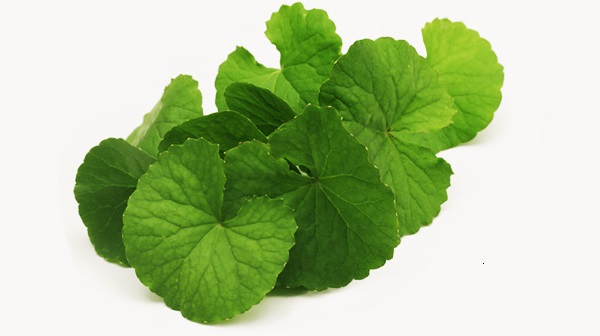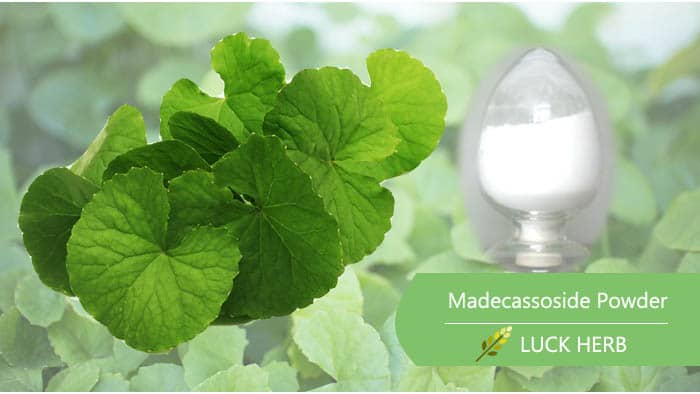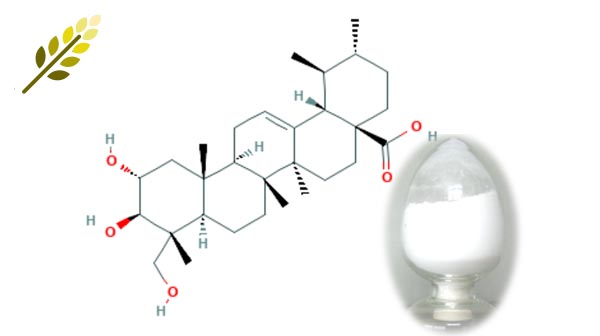
2022 Bulk Asiatic acid Powder Manufacturer
Asiatic Acid Properties
| Product Name | Centella Asiatica Extract Asiatic acid |
|---|---|
| Other Name | Gotu Kola Powder Dammarolic acid |
| Active Ingredient | Asiatic acid |
| Specification | 50%~95% |
| CAS NO | 464-92-6 |
| Molecular Formula | C30H48O5 |
| Molecular Weight | 488.7 g/mol |
| Test Method | HPLC |
| Part Used | Gotu Kola leaf |
| Origin | GuangXi , China |
Asiatic Acid Introduction
 What is Asiatic acid?
What is Asiatic acid?
Asiatic acid, a white powder primarily obtained from Centella Asiatica leaf, is a type of pentacyclic triterpenoid compound. The chemical name of Asiatic acid is [trans-(1R, 9S)-8-Methylene-4, 11, 11-trimethylbicyclo [7.2.0] undec-ene] and also commonly recognized as Gotu Kola Extract, Centella Asiatica extract, Dammarolic acid, etc. The molecular formula of Asiatic acid is C30H48O5. The molecular weight is 488.709 g/mol. Asiatic acid is poorly soluble in water and dissolves at saturated saline at the concentration of 0.1583 mg/mL. The rapid metabolism of Asiatic Acid makes less bioavailability. The color of the Asiatic acid powder is white. CAS number of Asiatic acid is 464-92-6.
Asiatic Acid sources
The leaves of C. Asiatica are a common source of Asiatic acid. A titrated Centella Asiatica formulation of C. Asiatica contains 30% of Asiatic Acid, 30% madecassic acid, and 40% asiaticoside to treat skin wound healing. Centella Asiatica L. is a tropical medicinal herb that is indigenously available in Africa, Southeast Asian countries like the Indian subcontinent, and Oceanic countries. Apart from Centella Asiatica, Actinida arguta, Actinida macrosperma, and Ilex pubescens root contain Asiatic acid. The whole plant of Averrhoa carambola, Brassica juncea, Citrus microcarpa Bonge, Cichorium intybus L., Clematoclethra scandens, Glechoma hederacea L., Eucommiae Cortex, Gynura bicolor, Hemerocallis fulva, and Ligustrum lucidum Ait. also contain Asiatic acid. Leaves of some plants like Combretum nelsonii, Combretum fragrans I, Ilex cornuta, and Lagerstroemia speciosa contain this phytochemical as a bioactive ingredient. Therefore, leaves, flowers, and aerial parts with traces in bark, stem, roots, and rhizomes of plants contain Asiatic acid.
Constituents of Centella Asiatica extract
Centella is composed of centelloids, which are chemically known ursane-type pentacyclic triterpenoids. The leading active ingredients included in the centelloids are asiaticoside, madecasosside (brahminoside), Asiatic acid, and madecassic acid (Brahmic acid). Other triterpenoids included active constituents in Centella are: asiaticoside C, D, E, F; centellasaponin B, C; isothankunic acid and oleanane type saponins, e.g. terminolic acid; centellasaponinD. C. Asiatica contains about 0.1% essential oils with α-humulene, germacrene B/D, β-caryophyllene, flavonoids, sesquiterpenes, and steroids. The range of Saponins present in Centella is from 1% to 8%. European Pharmacopoeia mentioned that Centella contains not less than 6.0% of Saponins.
Asiatic Acid forms and specifications
Both 80% and 90% purity Asiatic acid extracted from Centella plants are available in the market. These products can be ordered from a manufacturing company. According to the order placed with the manufacturer, the ordered amount is sent to the respective address through different courier services. Usually, the minimum ordered quantity is one kg. Different formulations are available with a mixture of Asiatic acid with other active ingredients. These are as follows:
Asiatic acid with vitamin C: It has been found that in combination with vitamin C, the wound healing property and collagen synthesis ability of Asiatic acid increases because of the potent antioxidant property of vitamin C.
Asiatic acid and madecassic acid: Asiatic acid and madecassic acid are two natural pentacyclic triterpenoids of Centella Asiatica. A combination of Asiatic acid and madecassic acid improves metabolic capacity. A combination of these ingredients is used in the ointment, liquid, and cream formulations that are available in the market.
Asiatic acid skincare vs. felueric acid
Asiatic acid has multiple benefits in skincare. Along with strong antioxidant and anti-inflammatory properties, Asiatic acid is effective in preventing premature aging because of the detrimental effect of UV radiation. Asiatic acid also accelerates wound healing and gives potential benefits against Keloids.
Ferulic acid is also a plant-based antioxidant. Skincare formulations like anti-aging skincare products contain Ferulic acid along with vitamin C. Ferulic acid helps to stabilize vitamin C and also enhances photoprotection or minimizes sun damage.
How does Asiatic Acid work
Asiatic acid modulates enzymes and receptors to exert multiple therapeutic properties. For example:
α- glucosidase enzyme inhibition exerts antidiabetic, leukotriene C4 synthase pathway exerts hepatoprotective, HMG Co-reductase inhibition leads to anti-hyperlipidemic, Lipase inhibition causes anti-obesity, COX-2 inhibition exerts anti-inflammatory properties.
Moreover, AGE receptor inhibitory effects of Asiatic acid inhibit skin aging and brain aging symptoms. Likewise, Asiatic acid modulates some other specific receptors also to exert other therapeutic benefits.
The Asiatic Acid manufacturing process
Extraction of C. Asiatica is the primary biosynthesized process of Asiatic acid. The solvent compounds used for the extraction process are methanol, ethanol, hexane, water, ethyl acetate, etc. Using subcritical water for extraction of C. Asiatica yields a higher extraction value than traditional liquid solvent extraction with methanol or ethanol at room temperature. Supercritical fluid extraction(CO2) emerges as a potential alternative to conventional liquid solvent extractions due to low extraction yields, long extraction times, and residual toxic organic solvents in final products. Stringent quality control guidelines are followed in the pharmaceutical and chemical industry to ensure the safety and efficacy of the products for human use.
Asiatic acid benefits
Research has revealed that Asiatic acid holds a wide range of health properties such as skin care,anti-depression, liver protection, and anti-cancer activity. Recently its anti-tumor function has been a hot area of research, just like its wound-healing effect in the early years.
Asiatic acid and Skincare
The ultraviolet light, environmental pollution, and genetic factors induce photoaging or premature skin aging symptoms. Asiatic acid prevents the reactive oxygen species (ROS) generation, and lipid peroxidation occurs due to UVA-photoaging. The anti-wrinkle benefit of Asiatic acid is comparable with retinol. Asiatic acid averts the human skin keratinocyte cells because of UVA-induced ROS. The antioxidant and anti-inflammatory properties of Asiatic acid prevent detrimental effects of both UVA and UVB radiation.
Asiatic acid obtained from the plant C. Asiatica is recognized as a skin wound healer. In combination with other active ingredients like asiaticoside and madecassic acid, Asiatic acid is effective in treating scars, systemic scleroderma, and keloids. Asiatic acid promotes multiple skin wound healing, like small wounds, hypertrophic scars, and burns. Asiatic acid enhances the synthesis of hydroxyproline, glycosaminoglycan, total protein, DNA, dry weight, collagen, and uronic acid in wounds. Thus, it helps in wound healing. Asiatic acid also activates growth factor genes and genes involved in angiogenesis and remodeling of the extracellular matrix that also promotes wound healing.
Abnormal wound healing can cause keloids which are benign dermal scars. Collagen deposition is a characteristic feature of keloids. AA suppresses collagen deposition by activating Peroxisome proliferator-activated receptor gamma. Asiatic acid
Asiatic acid and anti-cancer
Different preclinical and clinical studies reported that Asiatic acid has anticancer potential. Asiatic acid has chemopreventive efficacy. It has been found that Asiatic acid controls tumor cell growth that occurs in the breast, liver, gastrointestinal cells, skin, brain, and gastrointestinal cells. AA follows the following anticancer mechanisms:
- Reduces inflammation,
- Suppress tumor cell proliferation
- Induces apoptotic pathway
- Inhibits transcription factors (NF-κB, p38-MAPK, and ERK kinases) in a variety of tumor cells.
- Regulates cell proliferation by modulating cellular signaling pathways
- Control tumor suppression by regulating growth factors like p53 and p21
- Negatively affects the apoptotic mediators, inflammatory mediators, and oncogenes.
Asiatic acid suppresses tumor progression by inhibiting cell proliferation, inducing cell cycle arrest, and apoptotic cell death in numerous cancer cells. Asiatic acid also increases the anti-angiogenic activity and sensitivity of cancer cells to treatment with chemotherapeutic agents.
Alzheimer’s disease
Alzheimer’s disease is a neurodegenerative disease condition with a complex etiology. This disease leads to irreversible deterioration of the physical and mental condition of the affected individual, which further worsens over time. In 2000, a team of researchers first showed that Asiatic acid effective against neurotoxicity induced by Aβ. Subsequently, many research studies found that Asiatic acid also provides a favorable impact against cognitive impairment and reduction in oxidative stress. Medical researchers suggested that Asiatic acid has potent neuroprotective activity against neurotoxicity and brain aging. Asiatic acid reduces inflammatory mediators in the hippocampus and cortex of the brain. Asiatic acid can reduce nitric oxide production and enhance antioxidant defense mechanisms. The research findings also supported that Asiatic acid can improve memory in dementia. All the study findings indicate that Asiatic acid is a novel pharmaceutical agent that improves Alzheimer’s disease condition.
Asiatic Acid side effects
Several research studies have already been performed on C. Asiatica extract containing Asiatic acid, along with other major phytochemicals present in this plant. But no specific toxicity or safety analysis was performed for Asiatic acid. Asiatic acid has hepatoprotective effects against environmental toxins, pharmaceutical agents, metals, and industrial chemicals. But the potential risk for drug interaction of Asiatic acid is high because of the inhibitory effect of liver enzymes.
It is necessary to mention that a pre-clinical study result reported that Centella Asiatica leaf extract caused contact dermatitis by a weak skin irritancy effect because of sensitizing action. Researchers also found that C. Asiatica leaf extract has antispermatogenic and antifertility effects, though it is non-genotoxic and non-carcinogenic.
Asiatic Acid dosage
According to pre-clinical research findings, the 20 to 500 mg/kg dose range of Asiatic acid has pharmacological effects. It is necessary to mention that Asiatic acid was administered orally or intraperitoneally in pre-clinical studies to show the pharmacological effect. The analysis of the dose-response relationship, pharmacokinetics, and regulatory toxicity data obtained from pre-clinical research is essential for determining the dosing of Asiatic acid for human use and clinical drug development.
Where to buy bulk Asiatic Acid powder
Centella Asiatica or Gotu kola extract is one of the key products of Luck Herb Biotechnology Co., Ltd. LuckHerb supplies high-standard quality herb extracts. This manufacturing company also has an R&D department. Shanghai-based company has high-tech equipment facilities and outstanding research teams holding the whole technology of herbal extract. LuckHerb has been producing and developing high-quality, wholesale Asiatic Acid extract.
Send Inquiry
You may also have interesting …
References:
- https://www.ncbi.nlm.nih.gov/pmc/articles/PMC6131672/
- https://www.chemicalbook.com/ChemicalProductProperty_EN_CB5109340.htm
- https://pubchem.ncbi.nlm.nih.gov/compound/Asiatic-acid#section=Molecular-Formula
- https://schmelzkopfcosmetics.com.au/wp-content/uploads/2016/04/Bylka_et_al-2014-Phytotherapy_Research.pdf-centella-dermatologists.pdf
- https://www.reddit.com/r/AsianBeauty/comments/ckme4r/research_centella_asiatica_vitamin_c_may_work/
- https://www.mdpi.com/1420-3049/20/2/3001
- https://go.drugbank.com/drugs/DB14054
- https://www.healthline.com/health/ferulic-acid#skin-benefits
- https://pubchem.ncbi.nlm.nih.gov/compound/Asiatic-acid
- https://luckherb.com/wp-content/uploads/2020/11/Luckherb-Asiatic-acid-95-COA.pdf

 What is Asiatic acid?
What is Asiatic acid?